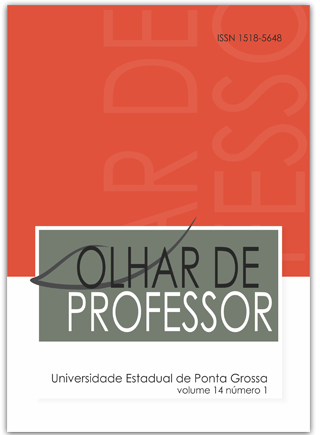Um estudo qualitativo sobre inclusão escolar. Doi: 10.5212/OlharProfr.v.14i1.0011
Conteúdo do artigo principal
Resumo
A inclusão escolar de crianças com defi ciência é uma realidade na atualidade do campo educacional do país. Como em toda mudança de paradigma, esse movimento tem encontrado difi culdades em ser implementado (MANTOAN, 2006). Para Marquezan (2009), nossa legislação traz um discurso redutor do sujeito defi ciente e Diniz (2007) esclarece que uma compreensão simplifi cada da defi ciência, como expressão de uma lesão, limita a participação social do indivíduo. Este trabalho é de cunho etnográfi co, em que privilegiamos observações e entrevistas aprofundadas. Tem como objetivo descrever, conhecer e analisar modos de agir de professores cujas salas de aula têm alunos considerados "incluídos" em duas escolas, uma pública e outra privada, na cidade de Petrópolis, escolhidas por serem "escolas inclusivas". Como resultado da pesquisa, observamos que práticas integracionistas e segregacionistas convivem com práticas inclusivistas e se misturam no cotidiano das escolas. Buscamos nesta pesquisa ampliar as formas de pensar sobre as práticas pedagógicas a partir de uma mudança de concepção sobre a deficiência e no reconhecimento da diferença como um elemento favorecedor da aprendizagem.
Downloads
Detalhes do artigo
Autores que publicam nesta revista concordam com os seguintes termos:
a) Os autores mantêm os direitos autorais e concedem à revista o direito de primeira publicação, com o trabalho simultaneamente licenciado sob a Creative Commons Attribution License Atribuição 4.0 Internacional (CC BY 4.0) que permite o compartilhamento do trabalho com reconhecimento da sua autoria e publicação inicial nesta revista.
b) Os autores são autorizados a assinarem contratos adicionais, separadamente, para distribuição não exclusiva da versão publicada nesta revista (por exemplo, em repositórios institucionais ou capítulos de livros), com reconhecimento da sua autoria e publicação inicial nesta revista).
c) Os autores são estimulados a publicar e distribuir a versão onlline do artigo (por exemplo, em repositórios institucionais ou em sua página pessoal), considerando que isso pode gerar alterações produtivas, bem como aumentar o impacto e as citações do artigo publicado.
d) Esta revista proporciona acesso público a todo o seu conteúdo, uma vez que isso permite uma maior visibilidade e alcance dos artigos e resenhas publicados. Para maiores informações sobre esta abordagem, visite Public Knowledge Project, projeto que desenvolveu este sistema para melhorar a qualidade acadêmica e pública da pesquisa, distribuindo o OJS assim como outros softwares de apoio ao sistema de publicação de acesso público a fontes acadêmicas.
e) Os nomes e endereços de e-mail neste site serão usados exclusivamente para os propósitos da revista, não estando disponíveis para outros fins.
______________

Este obra está licenciado com uma Licença Creative Commons Atribuição 4.0 Internacional.





